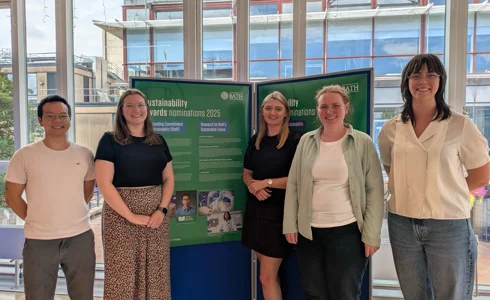
Jesse Wise
Theme
Transport, Behaviour and SocietyProject
SMEs as mediators of pro-environmental social transformations: Designing and evaluating behaviour change interventions for scalable transport-demand-side mitigationSupervisor(s)
Prof Lorraine Whitmarsh, Dr Sam HamptonBio
Jesse graduated from the University of Edinburgh in 2022 with a first-class MA (Hons) in Psychology and Economics. During her degree she focused on the design and evaluation of interventions aimed at changing behaviour for the public good. Her undergraduate dissertation tested how framing voluntary climate actions as losses or gains influenced cooperation, and her MRes thesis examined how political signalling shapes opposition to Low Traffic Neighbourhoods.
Jesse applies a wide range of methods to fit the tool to the job. So far she has drawn on experimental economics, computational psychology, traditional quantitative and qualitative methods and creative arts-based approaches.
Motivated by the need for demand-side solutions to complement technological advances in reducing UK carbon emissions, Jesse has turned her attention to the transport sector, where emissions remain persistently high and behaviour particularly resistant to change. She joined the AAPS CDT to explore how behavioural interventions can support more sustainable travel and help reduce demand-side emissions. Her current work is particularly focused on the role of middle actors in climate mitigation and adaptation.
Fun Facts
- In my spare time I am an avid rock-climber.
- I also love board games. To this day, my favourite weekend trip away was spent at the largest board game convention in the world. 100,000 people attended!
- I spent lockdown working on a farm on the Isle of Arran. Even though I didn't have my license, my boss lent me his quad-bike, which would skip between 2nd and 4th gear and had no breaks.... best commute of my life!
SMEs as mediators of pro-environmental social transformations: Designing and evaluating behaviour change interventions for scalable transport-demand-side mitigation
UK surface transport emissions have overshot the sixth carbon budget by 224 MtC, requiring emission cuts ten times those saved during the COVID-19 pandemic. Improvements in the quantity, quality, and speed of Travel Demand Management (TDM) implementation is urgently needed if the UK is to meet its target to reduce car miles by 9% before 2035. Employers can act as a bridge between their employees and broader transport policy goals by providing a social context and communicating norms. Employers control the physical and social environments of their employees, shaping their employees’ modal choice. Workplace Travel Plans (WTPs) are long-term TDM strategies developed by organisations to manage their staff’s commutes. They are flexible, cost-effective, (relatively) rapid, and publicly acceptable.
Only 11% of organisations in the private sector currently have a WTP and this must increase to 56%, all else equal, if the UK is to achieve target its Net Zero targets of reducing car miles by 9% before 2035. WTPs can be secured from large employers using the planning process, but not from SMEs, who employ 61% of the UK population. At SMEs the motivations of one or two key decision-makers in SMEs are crucial in the decision to adopt innovations – yet we know very little about what drives their voluntary adoption. Behaviour change interventions could target these key decision-makers to adopt a WTP, catalysing widespread change in travel behaviour.
This thesis focuses on three problem areas in achieving scalable demand mitigation; what is the opportunity for SMEs to contribute to modal shift? What factors can explain voluntary workplace travel plan adoption? Under what conditions could a tipping point in the adoption of workplace travel plans be created? By addressing these questions, this research aims to contribute to achieving a social tipping point in mobility behaviour, ultimately accelerating the transition to sustainable mobility behaviours.




